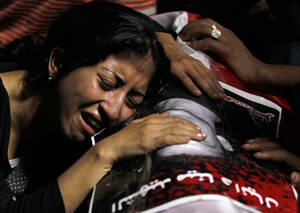Archbishop Silvio M. Tomasi, the Holy See’s permanent observer to U.N. offices in Geneva, told the U.N. Human Rights Council that attacks on Christians in Africa, the Middle East and Asia more than tripled between 2003 and 2010. He said on March 1, “Approximately 70 percent of the world’s population lives in countries with high restrictions on religious beliefs and practices, and religious minorities pay the highest price.” He added that rising restrictions on religion affect more than 2.2 billion people. Archbishop Tomasi denounced “intolerance that leads to violence and to the killing of many innocent people...simply because of their religious convictions.” The international community must work, he said, “to sustain mutual tolerance and respect of human rights and a greater equality among citizens of different religions...to achieve a healthy democracy, where the public role of religion and the distinction between religious and temporal spheres are recognized.”
Attacks on Christians
Show Comments (
)
Comments are automatically closed two weeks after an article's initial publication. See our comments policy for more.
The latest from america
At a Mass for the Jubilee of Youth outside Rome, Pope Leo exhorted over a million young people to be "seeds of hope" and a "sign that a different world is possible."
Perhaps it is the hard-won wisdom that comes with age, but the Catholic rituals and practices I once scorned are the same rituals and practices that now usher me into God's presence, time and time again.
"Only through patient and inclusive dialogue" can "a just and lasting conflict resolution can be achieved" in the long-running conflict between Israelis and Palestinians, said the Holy See's permanent observer to the United Nations.
The ”Bad Guys” films ask, how do we determine who the “bad guys” are? And if you’re marked as “bad” from the start, can you ever make good?








